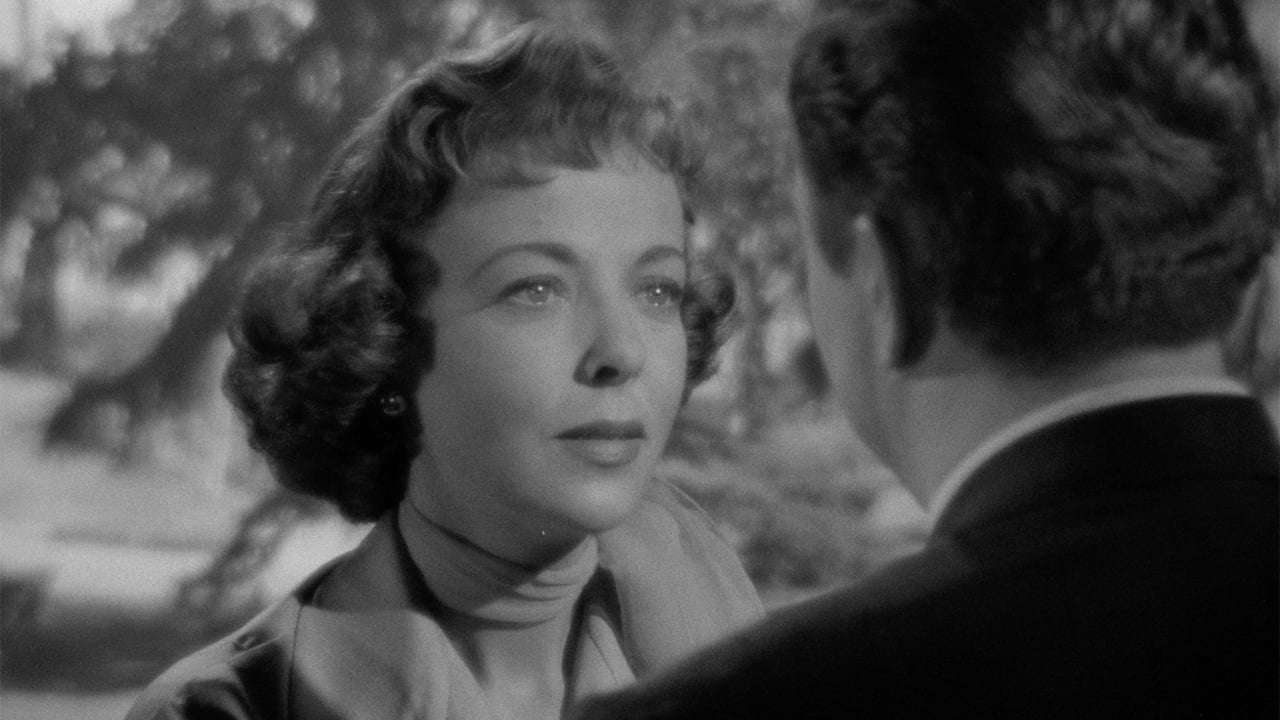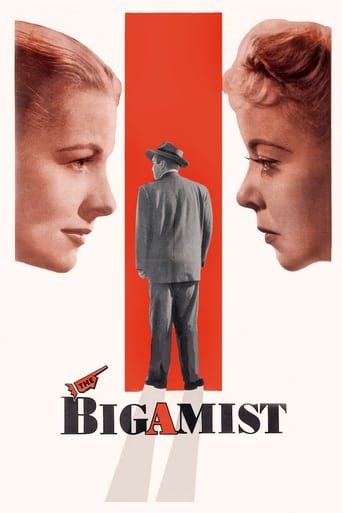

Purely Joyful Movie!
... View MoreCharming and brutal
... View MoreThe first must-see film of the year.
... View MoreGreat story, amazing characters, superb action, enthralling cinematography. Yes, this is something I am glad I spent money on.
... View MoreThough hampered by the fact that this an independent film without big studio distribution, The Bigamist was a decent enough film and did well by two of its three stars Joan Fontaine and Ida Lupino. Lupino also doubled as director. As for Edmond O'Brien I can scarcely believe the character he's playing. O'Brien plays a successful businessman who marries the boss's daughter and winds up running the business as the father gradually leaves control to him. They're seeming happy enough until O'Brien visits Los Angeles on a trip and meets Ida Lupino. Seems as though she sparks something that Fontaine never has in O'Brien.He winds up married to both with a child with each, the one with Fontaine adopted. The circumstances were at bit much and O'Brien just seems to drift never taking charge or making a choice. The film is almost an argument for polygamy.Usually bigamy as a film subject is treated as comedic. In the same decade of the Fifties both Clifton Webb in The Remarkable Mr. Pennypacker and Alec Guinness were done with humor, good satirical humor. The Bigamist doesn't have any laughs.All this is told in flashback within a flashback, a trial with Kenneth Tobey defending O'Brien and within that O'Brien explaining himself to Edmund Gwenn who plays a child welfare case worker who was investigating O'Brien and Fontaine and discovered this whole business.In fact Gwenn is as incredulous as I was at how an apparently decent man like O'Brien could have so screwed up his life. That was my feeling after seeing The Bigamist.
... View MoreOne of a handful of low budget films from pioneering woman film-maker Ida Lupino. Known mainly for her soulful screen portrayals in the 1940's of downtrodden women, she managed this career turn in the early 50's, a remarkable feat given a production industry so thoroughly dominated by men.Her best known feature is the chilling and critically acclaimed account of serial killer Emmet Myers, called "The Hitchhiker". But all her films are marked by an earnest concern for the lives of ordinary people, whether menaced in extreme circumstance or in more ordinary circumstance by the unwed pregnancy of "The Outrage". Moreover, at a time when studios were fending off small screen television with big budget Technicolor, she gamely persisted with the small, the intimate and the unglamorous."The Bigamist" remains an oddity, very much an artifact of its time, but worth viewing for its sensitive handling of male loneliness, a topic for which macho Hollywood has never had much time. The acting is first-rate from a trio of de-glamorized Hollywood professionals, including the poignant Lupino; there's also Edmond O'Brien in a low-key, nuanced portrayal of a man trapped by emotions, showing once again what a fine, intelligent performer he was. Notice how elliptically the pregnancy is presented, and how subtly Fontaine's career woman is projected into the breakup. Both are very much signs of that time. Although the subject matter may have tempted, the results never descend into bathos or soap-opera, even if final courtroom scene appears stagy and anti-climatic. All in all, it's a very well wrought balancing act.Lupino's reputation should not rest on gender. This film as well as so many of her others demonstrate what a versatile and unusual talent she was, whether in front of the camera or behind. Too bad, she never got the recognition from an industry to which she contributed so much.
... View MoreA poor shlub doesn't get enough love from his high-powered wife. One day the lonely traveling salesman meets the perfect shoulder to cry on -- a simple waitress who asks nothing of him, whom he impregnates. Edmund O'Brien somehow manages to be sympathetic in the role of a man who is dominated by his emotions and then tries to deal with the consequences. I also enjoyed Edmond Gwenn as an elderly adoption investigator who shows interest and empathy as Harry unravels his strange tale. It isn't clear from this film how the authorities get wind of Harry's crime. But that they did and he's convicted. His sentence and the identity of his destined domestic partner -- or lack thereof -- is left to the viewer's imagination, an excellent use of ambiguity. In all, this was an odd and memorable surprise.
... View MoreTraveling Salesman Edmund O'Brien is in a spot. He has been caught as a bigamist and tells how he got into this predicament. In San Francisco, he's already married to a sweet lady (Joan Fontaine) who is like every perfect TV wife. Then, while on business in Los Angeles, he goes on a tour of the stars homes and meets Ida Lupino who happens to be on the tour just because she likes to rest on buses. After seeing the homes of James Stewart, Jack Benny, Barbara Stanwyck, Jane Wyman and Edmund Gwenn (who plays the character O'Brien happens to be telling his story to), they go to the Chinese restaurant where Lupino works. One thing after another happens, and O'Brien finds himself proposing to the ailing Lupino. Once everything is exposed, O'Brien ends up in court where the two wives see each other for the very first time.This is more of a character study than the plot of a movie. It feels like it could be more appropriate for a TV anthology series at under an hour. Lupino is an expert director and actress, and like Fontaine's role, her character is extremely likable. It's understandable why O'Brien would be drawn to both of them. Yet, why the man doesn't find a profession to keep him near his first wife (Fontaine) to prevent his loneliness is never addressed. I longed for an actual speaking scene between Lupino and Fontaine who at different times in their lives (Lupino-prior, Fontaine-current) were married to the same man (Collier Young, who happened to write the screenplay). The film takes a long time to grab any interest, and by that time, it's more because you feel sorry for these characters rather than the pace of the movie.I was rather disappointed in the ending which I felt was a letdown. It gives the impression that the writer wanted to let the audience choose whom O'Brien ended back up with. Still, there's a glorious silent smile between Fontaine and Lupino that says more than a hundred words could.
... View More